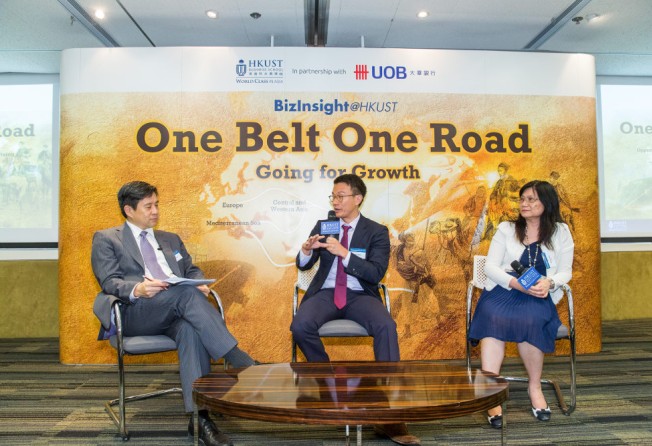HKUST Business School partners with UOB Hong Kong to talk about Belt and Road offers opportunities in Myanmar

[Sponsored article]
The second in the BizInsight@HKUST-OBOR Talk Series looked at opportunities in Myanmar brought about by China’s Belt and Road initiative. Hosted by the Hong Kong University of Science and Technology (HKUST) Business School, the seminar highlighted how local businesses and investors could benefit from belt and road-related projects in Myanmar. The seminar, organised with event partner United Overseas Bank (UOB), featured prominent speakers and took place June 6 at the HKUST Business School’s central location.
Albert Park, professor of economics and director at the HKUST Institute for Emerging Market Studies (IEMS), said that Myanmar, which is situated on the Silk Road Economic Belt and the 21st Century Maritime Silk Road, is strategically positioned to benefit from the initiative. The Belt and Road initiative (formerly known as One Belt, One Road), led by China, aims to spur trade and economic activity in over 60 countries.
Park pointed out that Myanmar, like other countries along the Belt and Road corridors, could initially benefit from investment in infrastructure development, which is a priority of the initiative. “Countries such as Myanmar will be looking to leverage the connectivity that the infrastructure projects provide to accelerate their economic development,” explained Park. A substantial amount of the foreign direct investment (FDI) Myanmar is seeking to attract will come from mainland Chinese companies, as the country forges new partnerships and implements feasible models for economic growth. Park also believes that Hong Kong’s experience and expertise in financing, project management, and delivering high-quality infrastructure projects, could have a role to play in Myanmar’s infrastructure development.
The Belt and Road initiative involves more than 60 countries, and represents about a third of the global economy. Park stressed that the different cultures, operating environments, and government regulations, require a clear understanding of each project, and a strategic evaluation. “It is important that every project goes through a thorough process of identification, appraisal, implementation, and evaluation,” he said.
To help Hong Kong businesses, entrepreneurs, and investors make informed decisions, the HKUST Business School has launched programmes designed to provide specific information and insights. Along with the Belt and Road seminar series, it’s collaborating with other academic institutions, including the Institute for Emerging Market Studies at Moscow School of Management SKOLKOVO, to broaden the scope of its research.
The HKUST IEMS is conducting a comprehensive three-year research project to identify the opportunities and challenges as they unfold along the belt and road countries. Funding is by the Hong Kong Government’s Strategic Public Policy Research Scheme. “We are focusing on how the initiative, and various proposals, impact Hong Kong. We are assessing the opportunities the Hong Kong business community and government need to be aware of to take advantage of Belt and Road developments,” said Park.
David Chao, head of the Foreign Direct Investment (FDI) Advisory Unit at UOB Hong Kong, noted that Myanmar has a population size and geographical footprint similar to Thailand. Chao said that Myanmar’s business and investment opportunities are similar to those offered by Thailand 20 to 30 years ago when the Thai government introduced economic liberalisation measures to stimulate growth and encourage FDI into the country. The World Bank has characterised the country as being “one of the great development success stories” in social and development indicators. Chao mentioned that while there continues to remain challenges to investing in a frontier market such as Myanmar, the country’s economic potential remains attractive.
According to a Hong Kong Trade and Development Council research report, Hong Kong is the fourth largest FDI investor in Myanmar after the mainland, Singapore, and Thailand. “Hong Kong businesses are excited about the opportunities available in Myanmar,” said Chao, who cited the example of garment manufacturers moving their operations to Myanmar to take advantage of the country’s abundant labour, and consumer market potential.
Hong Kong and Singapore also serve as springboards for Mainland Chinese to invest in Myanmar. Chao said UOB, one of nine foreign banks licensed to operate in Myanmar, is working with customers in the hospitality, manufacturing and oil, and gas and power industries. He added that if a raft of proposed investor-friendly regulations is passed later in the year, there is potential for a further upswing in FDI and mergers and acquisitions. “While investors are aware of opportunities in the oil and gas industries, Myanmar offers many more business opportunities,” Chao said.
Shirley Chan, head of Transaction Banking at UOB Hong Kong, said that the food and beverage, hospitality, logistics, and healthcare sectors in Myanmar are attracting attention. “Some uncertainty remains regarding labour laws, operating regulations and an employee skills gap, but progress is definitely being made,” said Chan, who works closely with multi-national companies operating in Myanmar.